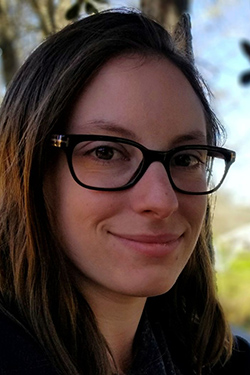When Amy Lynn Williamson moved to Georgia to attend Georgia Tech, it was the first time she had ever moved from Ohio, where most of her family lives. She completed her B.S. in Geosciences at Denison University, in Granville, a small town close to home. For Williamson, the move to Midtown Atlanta was a big step.
But she couldn’t resist the draw of Georgia Tech. “I was attracted to Georgia Tech because of its close-knit geophysics department,” Williamson says, “Even though Georgia Tech is a large research-oriented institute, EAS [School of Earth and Atmospheric Sciences] maintains a small and supportive environment.” Interdepartmental group meetings, yearly student symposia, and a graduate student activity group are some features of EAS that, she says, made her feel part of the community.
Williamson is receiving a Ph.D. in Earth and Atmospheric Sciences.
What is the most important thing you learned at Georgia Tech?
Georgia Tech taught me not only how to conduct research but also how to communicate it to a wider audience. In the research group of Andrew Newman, everyone worked on the same broad topics but each one had distinct research projects. This means constantly presenting and discussing our work and learning about everyone else’s projects. I had opportunities to present my research in small group meetings and in domestic and international conferences.
Georgia Tech and EAS were helpful every step of the way, from travel to large conferences to facilitating small symposia and events in the school.
"Georgia Tech and the School of Earth and Atmospheric Sciences were helpful every step of the way, from travel to large conferences to facilitating small symposia and events in the school."
What is your proudest achievement at Georgia Tech?
Defending my Ph.D. dissertation.
Not only am I in the first generation of my family to attend college, but I also will be the first person in my family to hold a doctorate degree.
What is your most vivid memory of Georgia Tech?
The hours spent in the gym with my groupmate discussing research and getting in shape to prepare for lugging instruments up the side of Costa Rica’s Arenal Volcano.
Who knew that lunges and talks about crustal deformation would mix?
What unique learning activities did you undertake?
During my first summer, I joined a research cruise to retrieve ocean bottom seismometers from off the coast of Vancouver Island. This experience showed me the breadth of research in seismology and geodesy. It was also my first to be on a research ship, and – given my new-found knowledge of sea sickness – it might be my last.
Midway through my Ph.D., I participated in a research-abroad program hosted by the National Science Foundation and the Australian Academy of Sciences. The program allowed me to work with new research collaborators in Canberra, Australia.
During this trip, I gained new perspective about my research by interacting with research groups that I otherwise would have interacted with only occasionally. I also experienced living and working abroad and the surreal situation of having a mob of kangaroos live right outside my front door.
What advice would you give to incoming graduate students at Georgia Tech?
Be involved in the greater Atlanta community. Get involved in outreach related to your field, attend events off campus, and make Atlanta more like a home, and not just a place where you work and study.
Even though I love Georgia Tech, it was great to get off campus, explore, and meet new people. I did this through running, with the local running club. Keeping up with a hobby off campus also helps manage the stressful moments during graduate studies.
Where are you headed after graduation?
I am headed to the University of Oregon where I will be a postdoctoral researcher focusing on tsunami hazards for the Pacific Northwest. My studies in the Newman research group helped me prepare for this role. Even though my dissertation topic and my future work in Oregon focus on a field that is not currently a major research area in Georgia Tech, my advisor has been incredibly helpful.
For More Information Contact
A. Maureen Rouhi, Ph.D.
Director of Communications
College of Sciences



